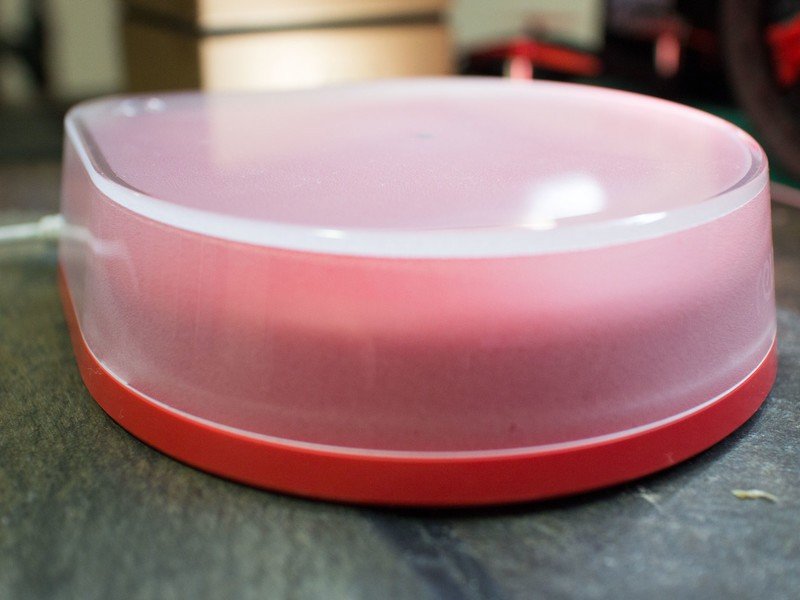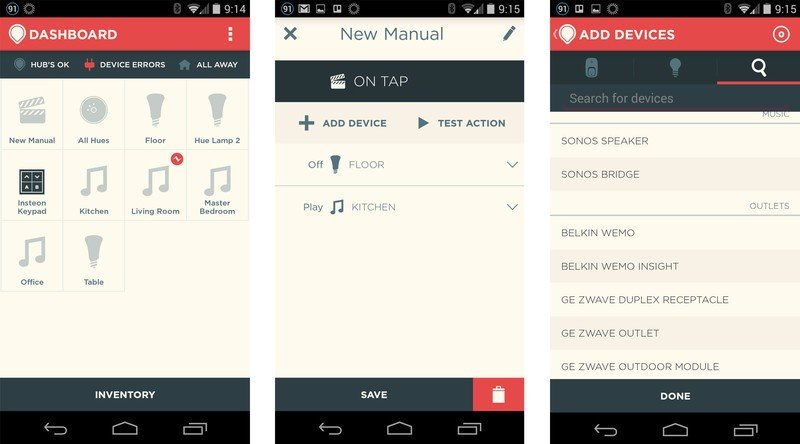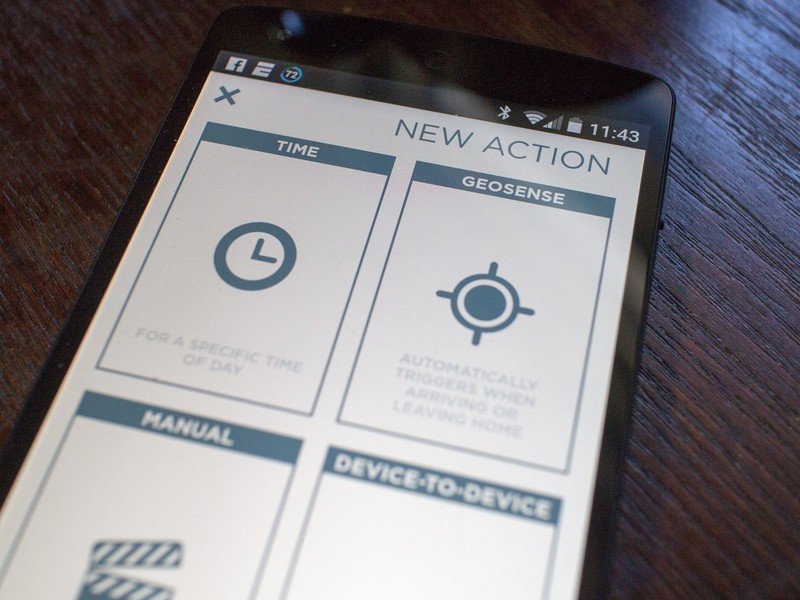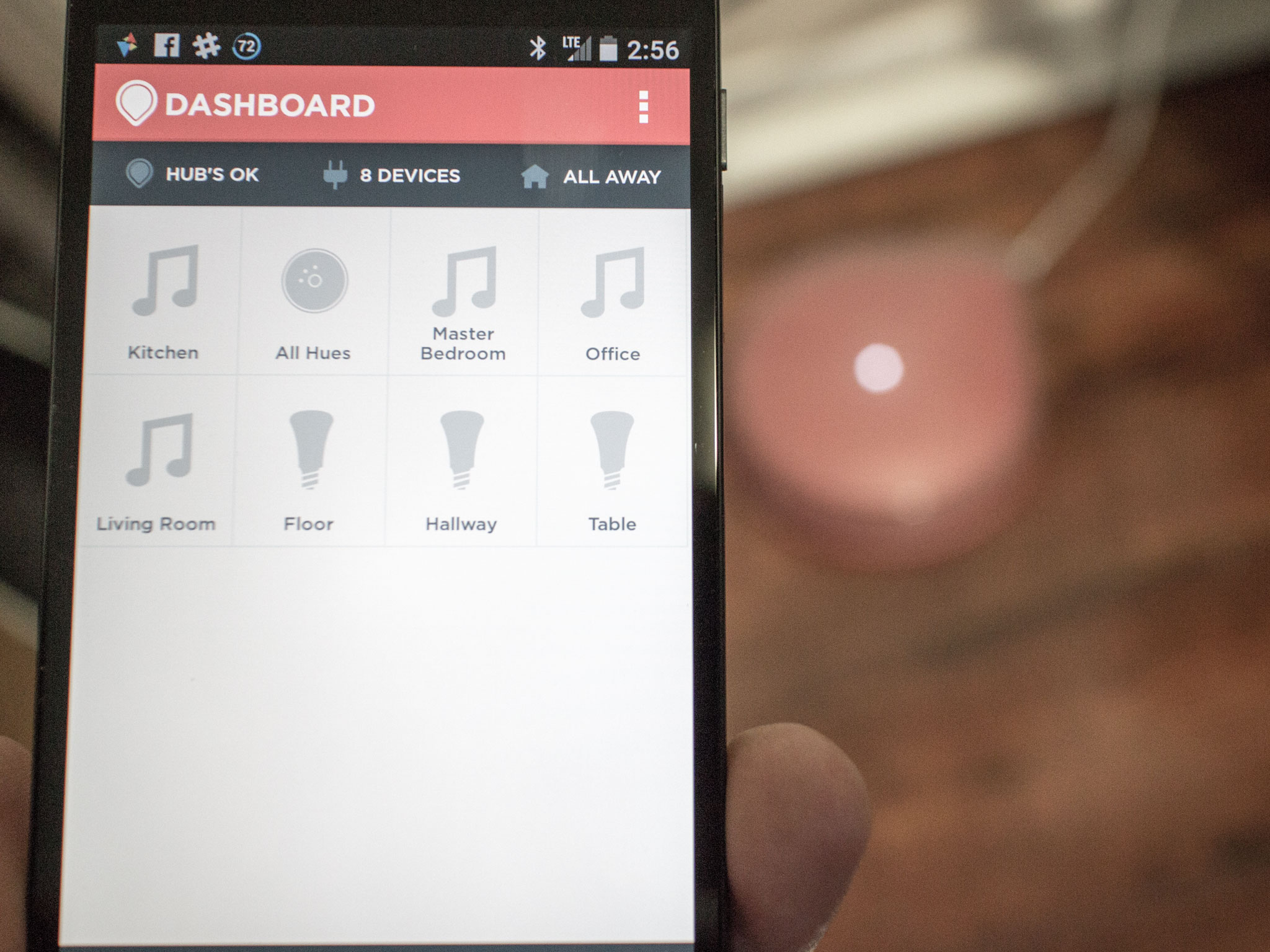If you have more than one connected device in your home, chances are you'll also have more than one app to control said devices. As you add more toys, you also get bogged down with more apps, more hubs, and an all around bigger mess. That's where Revolv comes in. The $299 Revolv hub sets out to automate all of your connected devices — from lights to door locks to home audio — all from one streamlined app. It's great if you're already loaded up with a bunch of connected devices, but if you only have a few, you may not even need it. Lets jump in and see what makes Revolv tick.
The red Revolv hub bears a striking resemblance to a CD spindle (for anyone that is old enough to remember them) and works off AC power — no need to hardwire to your router (which is awesome). Currently the hub supports the most popular smart home protocols — with 7 different radios including Z-Wave, Wi-Fi, and Insteon — so you can easily add all your smart devices like Sonos, Philips Hue, Belkin WeMo, Insteon, Nest, and many more.
Setting up the hub takes just a few minutes. Plug it in, download the app, and follow the instructions. The hub pairs to your home Wi-Fi network using FlashLink — so you just hold your phone over the hub and let the magic happen. I did have a few issues getting things to connect properly, but it only took me about three tries to get it all running. To be fair, I have a fairly complex modem / router setup that has me jump through a few hoops to get things connected.

Once you're setup, the Revolv app takes care of all the hard work. Within the main screen of the app you'll see your dashboard, where you can view your current devices, add to your inventory, or setup new actions for your system. Revolv obviously works better the more devices you have on the system, so you'll want to add as many as you can right from the start. Which brings us to the point that if you have a smart home but just a few connected devices (less than 3), then you probably don't need a Revolv hub at all — it's really geared toward those that have too many devices to manage and need to consolidate.
Revolv obviously works better the more devices you have on the system, so you'll want to add as many as you can right from the start.
After you add devices to your inventory (Hue, Sonos, WeMo etc). you'll see them all in your dashboard, each with it's own tile. Here you can control the devices one-by-one — turn on individual Hue lights, open a single lock, start playing a Sonos speaker — or tie them into one another, which is really the meat of what Revolv is all about.
It's when you start diving into the specifics of your connected devices that the Revolv begins to be a bit of a letdown. While you can add most devices and control some basic functions, many won't let you go much beyond that. Sonos, for example, will let you start or stop music, change volume, and jump tracks, but you don't have the functionality to choose playlists, browse music, or anything of that sort. Hue lights fall into the same boat. You can turn them on or off, or pick colors, but you can't dive too much further into any custom settings.
Having to pull out the specific device apps rather than just living in the Revolv app really just defeats the purpose of having an all-in-one to begin with. At the same time, if you're just looking for basic controls or turning devices on & off, then you will be happy with Revolv's feature set.

Revolv did a good job of picking up most of my devices automatically. It has no issue finding mainstream devices like Sonos, Hue lights, Nest, or Belkin WeMo devices. Where it struggled was with things like my not-so-mainstream Nexia system. I had to dive in and manually add my front door keypad to Revolv, and with the great walkthrough within the app, it was a bit of a chore to get done. I had to physically dismantle the lock on the door to get to the programming code, which Revolv needed to add the lock to the system.
Where Revolv really shines is in the automations and triggers — after all — it's mean to tie all of your connected devices into one central hub. Where you normally can't control your Sonos and Hue lights through one app, Revolv lets you to just that. You can create new actions based on time, geosense, manual or device-to-device.

Here's a quick breakdown of what each one means:
- Time: Set an action for a specific time of day. (Turn my lights on and play music at 5pm daily).
- Geosense: Automatically triggers when arriving or leaving home. (turn on my lights when I get near home, stop my music when I leave the house)
- Manual: Tiggered manually by you (tap a tile to turn on Hue lights and lock your front door)
- Device-to-Device: Use one of your devices as a trigger (when I turn on my Hue lamp, start playing my Sonos)
Setting up various combinations of these actions is a very powerful tool — and really what Revolv does best. It takes devices that would otherwise be unable to communicate with each other, and lets you use them together without a hitch. You can set actions as simple as turning on your lights when you get home from work, or have a manual "date night" trigger that unlocks your front door, turns up the temperature on your thermostat, sets your Hue lights to a romantic color and plays your favorite love songs playlist on your Sonos. You can use the Revolv as an alarm/timer as well, setting devices to turn on or off at specified times of the day. You can really go crazy making all of your devices play nice with one another. Actions are definitely my favorite feature of the Revolv Hub.
It takes devices that would otherwise be unable to communicate with each other, and lets you use them together without a hitch.
If you have the time and plenty of connected devices, you can really dig deep into creating some awesome actions. You can use the Revolv to monitor your home, turning on lights when it senses motion on your WeMo sensors.
Revolv will be getting even more interesting in the coming weeks as IFTTT integration rolls out. IFTTT lets you bring together even more connected devices and services, so you'll be able to max out your meekness using the Revolv Hub. The new integration means you'll be able to control some devices that weren't before available through IFTTT, which should make some users very happy.

Overall I really like what Revolv does, but it's not for everyone. $299 is a bit much to ask for a device that just brings integration for devices already in your home. Those of you that don't have many accessories already won't justifiable find use in Revolv, but those that have a lot of connected devices will be able to put Revolv's actions to good use.
As it stands now I'd still like to see more from Revolv. While the actions to tie devices together are great, the functionality for specific devices is limited when compared to what the native device apps can do on their own. The Revolv app can't yet be used as a total replacement for other individual apps, and that's something that needs to happen for Revolv to have a place in most connected homes.

Adam is the Editorial Director of High-Yield content at Future. Leading an outstanding team, he oversees many articles the publisher produces about subscriptions and services including VPN, TV streaming, and broadband. In addition to identifying new e-commerce opportunities, he has produced extensive buying guides, how-to-watch content, deal news, and in-depth reviews. Adam's work can be seen on numerous Future brands including TechRadar, Tom's Guide, T3, TTR, Android Central, iMore, Windows Central, and Real Homes.

